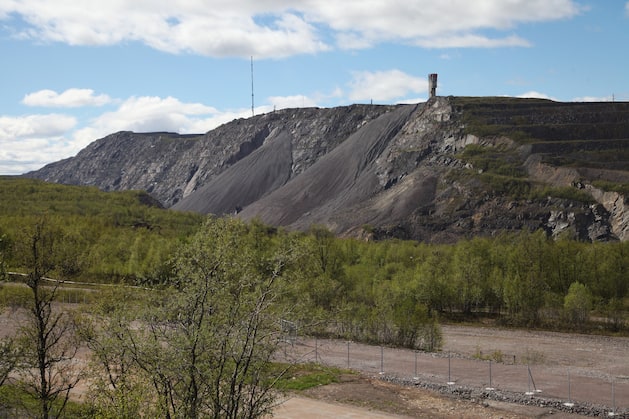Rare earths are an important component of electric cars and wind turbines, for example. This makes them a building block on the way to a more climate-friendly future. So far, China is the absolute world market leader – but a find in Sweden could change that.
A Swedish mining company claims it has discovered the largest known deposit of rare earths in Europe.
The deposit near a large iron ore mine in Kiruna contains more than a million tons of rare earth oxides, as the state-owned company LKAB announced on Thursday before the EU Commission visited the region.
This amount would be enough to cover much of the future EU demand for the production of permanent magnets, which are needed for electric motors in e-vehicles and wind turbines, among other things.
“This is good news, not only for LKAB, the region and the Swedish people, but also for Europe and the climate,” said CEO Jan Moström.
The deposit could become an important building block for the production of important raw materials that are crucial for the green transition.
At a press conference underground, he also pointed out that the full extent of the occurrence is unclear. “We don’t know how big it really is.”
LKAB operates the world’s largest underground iron ore mine in Kiruna. Due to ore mining, parts of the country’s northernmost city have to move a few kilometers – around 6,000 residents are being relocated, which corresponds to a third of the population.
The Per Geijer deposit was discovered some time ago in the immediate vicinity of the pit and has now been successfully explored.
Rare earths are also found in everyday objects such as smartphones, laptops and televisions. China dominates the world market, while there is currently no mining of rare earth elements in Europe. European countries are therefore dependent on imports for the production of e-cars and wind turbines.
These products need strong permanent magnets, which in the case of e-cars contain half a kilogram to several kilograms of the rare earths neodymium and praseodymium, depending on the size of the engine.
In Kiruna, a representative of the German automotive supplier Schaeffler emphasized the importance of raw material extraction in Europe. Schaeffler plans to produce many millions of electric motors, said Purchasing Manager Florian Schupp, who is responsible for the car business.
You need rare earths for that. Today, Schaeffler buys from outside Europe – but the aim is to increasingly cover demand in Europe.
Mining projects like those in Sweden are to be given more support from Brussels. In the spring, the EU Commission intends to propose measures to strengthen Europe’s strategic autonomy in relation to important raw materials. Another argument is that without this autonomy there can be no ecological and digital change.
According to a 2020 Commission report, the EU got 98 percent of its rare earth needs from China at the time.
At the same time, this means that Europe would have a huge problem if China were to throttle or even stop supplies for political or strategic reasons. In addition, demand in the course of electrification is likely to continue to rise sharply.
“The demand for rare earths, which are used in permanent magnets, for example for electric vehicles, digital technologies or wind generators, could increase tenfold by 2050,” says the Commission paper.
If you know which devices at home use how much electricity, you can make targeted savings. Our e-paper shows which devices consume how much electricity for all common household appliances, from ovens and hobs to refrigerators and washing machines to TVs and WLAN routers. There are also a number of instant power-saving tips.
However, according to LKAB, the road to possible mining of the metals in Kiruna is long. The first step is to apply for approval before the end of this year.
In view of other permitting processes in the industry, it should take at least 10 to 15 years before mining can actually begin and raw materials can be brought to market.
LKAB boss Moström demanded that the approval procedures would have to be changed in order to ensure increased mining of this type of raw material in Europe.
Access is a risk factor for the competitiveness of European industry as well as for climate protection.
Christine Lambrecht asked for her resignation as Minister of Defense on Monday. But the politician doesn’t have to worry even if she doesn’t have a job. After her resignation, the SPD politician collects a lot of money.
After the escalation on Saturday, the police reported a success on Sunday: the protest village in Lützerath was completely cleared. Meanwhile, the activists are complaining of serious injuries – the police, however, denied this. The situation in Lützerath in the Newsticker.








